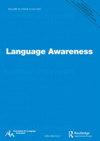认知能力和风格偏好的个体差异是否与多语言成年人在外显学习条件下的表现有关?
IF 2.2
2区 文学
0 LANGUAGE & LINGUISTICS
引用次数: 3
摘要
研究表明,当学习者面临不熟悉或困难的任务时,额外语言学习的个体差异可能起着更重要的作用。然而,迄今为止的研究主要集中在第二语言(L2)学习者/双语者身上,而多语言人群中的个体差异仍未得到充分研究。我们与大学水平的多语言成年人合作,比较了传统教学(熟悉)和基于概念的教学(不熟悉)在西班牙语过去时/时态区分教学中的效果。对学习者的目标结构知识进行了前后测试,并对学习者的语言学习能力、工作记忆能力、语言意象认知方式和态度进行了评估。虽然两个治疗组都表现出元语言知识的显著提高,但我们发现两组在获得的知识或态度方面没有统计学差异,认知能力的个体差异与观察到的收获无关。这组结果表明,在测试的教学条件下,认知个体差异似乎不再对这些多语种学生的表现起重要作用。此外,语言学习经历和已知语言之间的类型学接近程度都没有显著影响。我们认为,广泛的显性语言教学经验可能导致了一种平衡效应,正如之前在二语学习者中观察到的那样。本文章由计算机程序翻译,如有差异,请以英文原文为准。
Are individual differences in cognitive abilities and stylistic preferences related to multilingual adults’ performance in explicit learning conditions?
Abstract Research suggests that individual differences in additional language learning may play a more important role in taxing situations when learners are confronted with unfamiliar or difficult tasks. However, studies to date have mostly focused on second language (L2) learners/bilinguals, while individual differences within multilingual populations remain under-researched. Working with university-level multilingual adults, we compared the effectiveness of traditional instruction (familiar) and concept-based instruction (unfamiliar) to teach the past tense/aspect distinction in Spanish. Learners were pre- and post-tested on their knowledge of the target structure and assessed on language learning aptitude, working memory capacity, verbal-imagery cognitive style and attitudes. While both treatment groups demonstrated significantly improved metalinguistic knowledge, we found no statistical differences between the two groups in terms of knowledge gained or attitudes, and individual differences in cognitive ability were not associated with observed gains. This set of results indicates that the cognitive individual differences measured seemingly no longer played a significant role in these multilinguals’ performance in the instructional conditions examined. In addition, neither language learning experience nor typological closeness between known languages had any significant impact. We propose that extensive experience with explicit language instruction may have led to a levelling effect, as previously observed in L2 learners.
求助全文
通过发布文献求助,成功后即可免费获取论文全文。
去求助
来源期刊

Language Awareness
Multiple-
CiteScore
3.70
自引率
10.00%
发文量
18
期刊介绍:
Language Awareness encourages and disseminates work which explores the following: the role of explicit knowledge about language in the process of language learning; the role that such explicit knowledge about language plays in language teaching and how such knowledge can best be mediated by teachers; the role of explicit knowledge about language in language use: e.g. sensitivity to bias in language, manipulative aspects of language, literary use of language. It is also a goal of Language Awareness to encourage the establishment of bridges between the language sciences and other disciplines within or outside educational contexts.
 求助内容:
求助内容: 应助结果提醒方式:
应助结果提醒方式:


